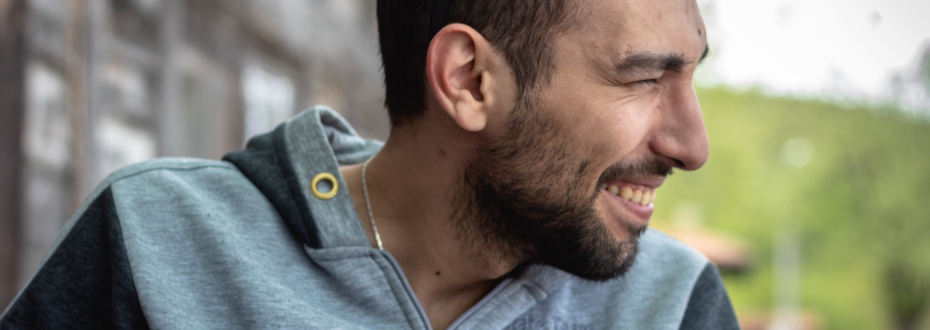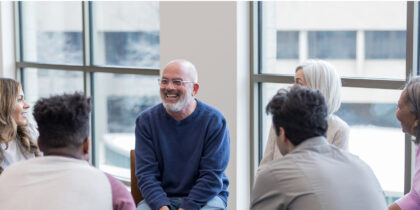Centre for Mental Health’s fourth Festival of Ideas 2023 event focused on mental health services. Our four panellists, Ellie Costello, Doreen Joseph, David Gilbert and Isaac Samuels, were interviewed by the Centre’s ambassador Marsha McAdam, and we took questions from people who registered to attend. All of our panel members brought lived, and living, experience of mental health services to the debate, with many years’ worth of knowledge from both using services and working with them to bring about systemic change.
Marsha’s first question for each panel member was, “It’s the NHS’s 75th anniversary and you are given a blank cheque. What would you spend it on?” All four were pessimistic and asked what strings were attached to the offer – and then shared their perspectives about what could change to make mental health services better. These are the four key themes that the panel shared:
Decolonising mental health services starts with a real understanding of racism and its impacts, both on people’s mental health and on the way services have operated. It requires an acknowledgement of the harm that systems have caused, and making reparation, for example by seeing people holistically and expanding beyond Western medicine – for example through offering faith-based and creative approaches: ‘mind, body and soul’.
Participatory approaches to mental health care require a shift in power and investment in people. Models such as patient leadership and experiential practice – summarised in Humanising mental health care – can offer a framework for a participatory approach. But to make a real difference, they must be authentic – creating roles and opportunities that are valued equally to professional roles, with an infrastructure in place to enable people to progress in their careers, including with reasonable adjustments where they are needed.
Respectful health care means services and staff ‘hold onto their humility’ to work with people relationally and validate people’s emotions, getting past ‘professional service fragility’. This also means putting people’s safety first, so that service users feel ‘held and known’; not threatened, for example, with being penalised or even discharged from services if they don’t behave in certain ways.
Health-creating services ‘support people to have really good mental health’. This means looking beyond managing illness or its symptoms to being there to help people to ‘have good lives’. And it means looking beyond the individual to recognising that people live in communities (of different kinds) which have assets and resources that can be harnessed to create health more equitably and effectively. We received dozens of questions both before and during the event. While we didn’t have time to put all of them to the panel, we’ve responded to some of the most asked questions below.
Question and answer:
How much does where someone lives impact their access to suitable treatment and support, and how do we bring better access for all?
We know there’s a postcode lottery in mental health services – both in terms of what services are available and how they are run. This can be for good reasons: for example, to be more responsive to local needs. But too often this level of variation isn’t justified and means people miss out. So we need enough national direction to set standards of what we should all expect (and how quickly it should be offered) while allowing local service planners to work with their communities to design services that meet their needs.
By the time a young person meets the threshold for support from Children and Young People’s Mental Health Services, they are in crisis. What can be done to support the system and families so that young people have the resilience to cope with their lives?
We need a comprehensive system of support for children and young people’s mental health. That means supporting parents and families from early on in their child’s life – for example through parenting interventions and health visiting. It means adopting a ‘whole school approach’ to mental health so that children are educated in mental health promoting environments and build their mental health literacy alongside other life skills. And it means having easy access to early help when children are first experiencing mental health difficulties rather than waiting for problems to reach crisis point.
How can change occur if mental health services cannot recruit staff?
The NHS mental health care workforce has been growing since the Long Term Plan was published in 2019, and campaigns such as Choose Psychiatry have helped to encourage more people to want to train in the mental health professions. But referrals to mental health services have been rising faster than the NHS can recruit more people, and that’s putting more pressure on a workforce that is already struggling after the pandemic and through the cost-of-living crisis. Peer workers and experiential practitioners, however, if they are valued and supported with reasonable adjustments, can help create a more diverse workforce with some of the essential skills we need in mental health services.
How can digital improve the service?
Many people have found that accessing mental health support online or through remote technology of various kinds is better or more convenient since they became more widespread in 2020. For others, digital support is no substitute for face-to-face mental health care. Adding digital and remote options to services can give some people more choice, but it mustn’t leave anyone behind if they prefer not to use it – or if they can’t do so because they don’t have the technology or can’t use it safely. For more information, check out our report on using remote technology in mental health services.
Does anyone have any brilliant ideas about how we can better support 16-25 year olds in this stretched and often inflexible system?
Young people and young adults need easy-to-access, age-appropriate support that is culturally competent, adapted to neurodiversity and affirms their identity. Too often they don’t get this support, and too many still face a loss of support when they reach 18. We’ve been campaigning with partners for an ‘early support hub’ using the Youth Information, Advice and Counselling Services (YIACS) model to be in every part of the country. But we also need NHS mental health services that provide effective support for this age group and better transitions between child and adult mental health care.
What is the panel’s understanding of the mental health inequalities and wider inequalities faced by people with a learning disability?
We know from research that children and young people with a learning disability face a significantly higher risk of poor mental health, but are less likely to get help that’s adapted to meet their needs. This is a fundamental inequity in our mental health system that has to change. Mental health services are not meeting their population’s needs if they are unable to work effectively with people with learning disabilities.
How far can we go in reducing the number of suicides in the UK?
We are expecting a new suicide prevention strategy from the UK Government shortly. All local areas in England also have their own suicide prevention plans. It’s vital that both national and local plans draw on the best available evidence to save lives, and bring organisations together to respond to intelligence quickly – for example by connecting public health services with local coroners.
How can we ensure that data gathering is truly reflective of people’s experiences of services provided?
This is a major challenge for mental health services, where routine data about outcomes is more difficult to produce than in other areas of health care. Timely access matters, so waiting time standards are important for mental health services, just as they are for elective surgery. Understanding what matters to people using mental health services is at the heart of collecting meaningful experience and outcomes data: knowing that often what gets measured is what matters to systems.
Join us next month on 9 August for our final Festival of Ideas event, where we’ll be hearing from a panel of experts about the climate crisis and its impact on mental health.
Sign up today.








